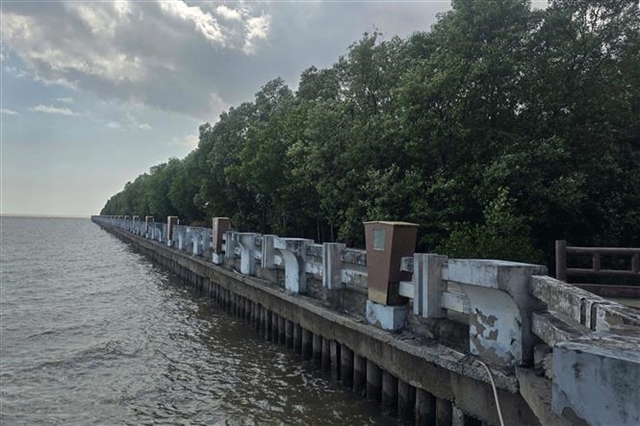 Society
Society

 |
| A dyke being built along the western coastline to curb erosion in the southernmost province of Cà Mau. — VNA/VNS Photo Kim Há |
CÀ MAU — The southernmost province of Cà Mau is seeking more than VNĐ26.8 trillion (US$1.05 billion) from the Government to invest in emergency works to prevent erosion, which is growing increasingly worse along the coast and threatening lives of local people.
Nguyễn Thanh Tùng, head of the Water Resources Sub-department of the provincial Department of Agriculture and Rural Development, said that the province requires more than VNĐ31.2 trillion ($1.22 billion) to invest in constructing erosion prevention works for coastal and riverine areas, as well as sea dykes.
Of this amount, the province is proposing that the Government support it with VNĐ26.84 trillion, while the provincial budget is expected to contribute VNĐ2.31 trillion ($90.7 million) and private capital VNĐ2.05 trillion ($80.4 million).
The province plans to invest in 177 erosion prevention projects. Specifically, there are ten coastal projects, 30 riverine projects, 36 erosion mitigation projects, five sea dyke projects and 96 river dyke projects.
Cà Mau currently has approximately 91km of coastline suffering from various degrees of erosion. For example, the western coast has 22km of dangerous erosion, the eastern coast has 29.15km of particularly dangerous erosion and there is 40.3km of dangerous erosion overall.
Regarding the eastern coastline, without any dyke systems yet in place, the rate of coastal erosion here is 45-50 metres per year, with some areas experiencing erosion rates of 80-100 metres per year.
It is predicted that without any protection erosion will continue to advance inland. The currently eroding sections of the eastern coast, which are at particularly dangerous and dangerous levels, have an average erosion rate of 45-50 metres per year. Therefore, protective measures are needed for the eastern coastline, totalling 69.45km.
With the current severe erosion rates, without immediate protective measures, coastal erosion will continue to result in the loss of significant land and protective forests, which have taken hundreds of years to form.
Notably, ongoing erosion into inland areas results in further loss of land and forests and threatens many existing infrastructure projects.
In addition, riverbank sections near estuaries that are eroding, or at risk of erosion, require proactive remediation and relocation efforts to minimise loss of life and property damage.
Cà Mau has one of the densest systems of rivers and canals in the country, with 87 river mouths leading into the sea and a coastline of 254km. Over the past decade, climate change has caused sea levels to rise, along with land subsidence and other extreme weather patterns, exacerbating the erosion of Cà Mau's riverbanks and coastline.
Currently, the total length of erosion across Cà Mau is approximately 187km out of the province's total coastline of 254km.
In the last ten years, landslides have been responsible for the loss of more than 5,200 hectares of coastal forests, equivalent to the size of a commune. — VNS




